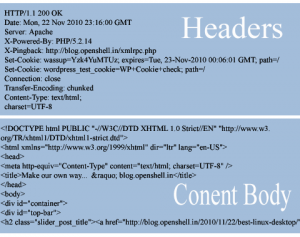cURL is a library which allows you to connect and communicate to many different types of servers with many different types of protocols. Using cURL you can:
- Implement payment gateways’ payment notification scripts.
- Download and upload files from remote servers.
- Login to other websites and access members only sections.
PHP cURL library is definitely the odd man out. Unlike other PHP libraries where a whole plethora of functions is made available, PHP cURL wraps up a major parts of its functionality in just four functions.
A typical PHP cURL usage follows the following sequence of steps.
curl_init – Initializes the session and returns a cURL handle which can be passed to other cURL functions.
curl_opt – This is the main work horse of cURL library. This function is called multiple times and specifies what we want the cURL library to do.
curl_exec – Executes a cURL session.
curl_close – Closes the current cURL session.
Below are some examples which should make the working of cURL more clearer.
Download file or web page using PHP cURL
The below piece of PHP code uses cURL to download Google’s RSS feed.
<?php
/**
* Initialize the cURL session
*/
$ch = curl_init();
/**
* Set the URL of the page or file to download.
*/
curl_setopt($ch, CURLOPT_URL,
'http://news.google.com/news?hl=en&topic=t&output=rss');
/**
* Ask cURL to return the contents in a variable
* instead of simply echoing them to the browser.
*/
curl_setopt($ch, CURLOPT_RETURNTRANSFER, 1);
/**
* Execute the cURL session
*/
$contents = curl_exec ($ch);
/**
* Close cURL session
*/
curl_close ($ch);
?>
As you can see, curl_setopt is the pivot around which the main cURL functionality revolves. cURL functioning is controlled by way of passing predefined options and values to this function.
The above code uses two such options.
- CURLOPT_URL: Use it to specify the URL which you want to process. This could be the URL of the file you want to download or it could be the URL of the script to which you want to post some data.
- CURLOPT_RETURNTRANSFER: Setting this option to 1 will cause the curl_exec function to return the contents instead of echoing them to the browser.
Download file or web page using PHP cURL and save it to file
The below PHP code is a slight variation of the above code. It not only downloads the contents of the specified URL but also saves it to a file.
<?php
/**
* Initialize the cURL session
*/
$ch = curl_init();
/**
* Set the URL of the page or file to download.
*/
curl_setopt($ch, CURLOPT_URL,
'http://news.google.com/news?hl=en&topic=t&output=rss');
/**
* Create a new file
*/
$fp = fopen('rss.xml', 'w');
/**
* Ask cURL to write the contents to a file
*/
curl_setopt($ch, CURLOPT_FILE, $fp);
/**
* Execute the cURL session
*/
curl_exec ($ch);
/**
* Close cURL session and file
*/
curl_close ($ch);
fclose($fp);
?>
Here we have used another of the cURL options, CURLOPT_FILE. Obtain a file handler by creating a new file or opening an existing one and then pass this file handler to the curl_set_opt function.
cURL will now write the contents to a file as it downloads a web page or file.
If you don’t have cURL functionality already installed, then please click on the following link to find out how install cURL,
https://blog.openshell.in/2011/01/enable-curl-for-php/


